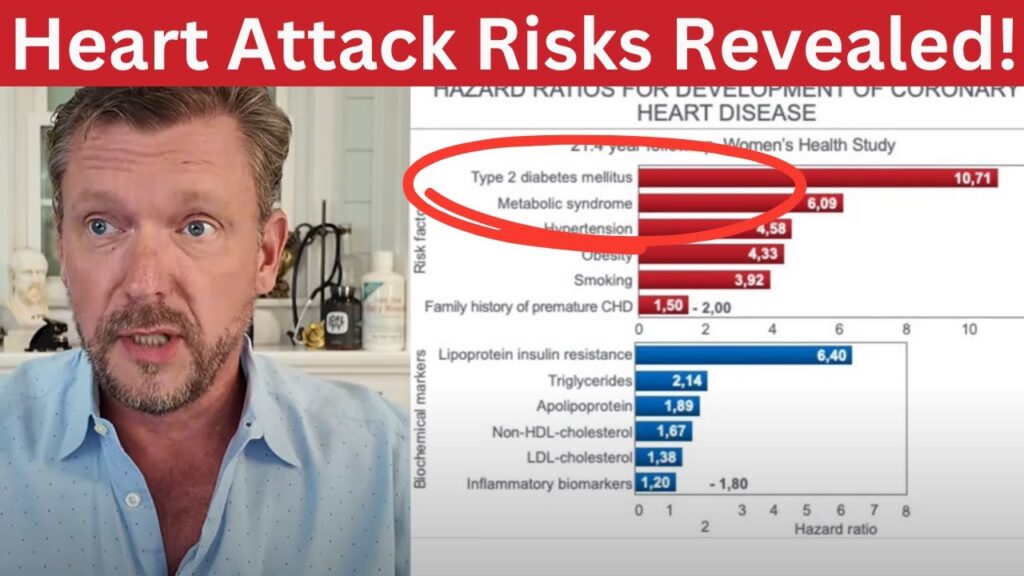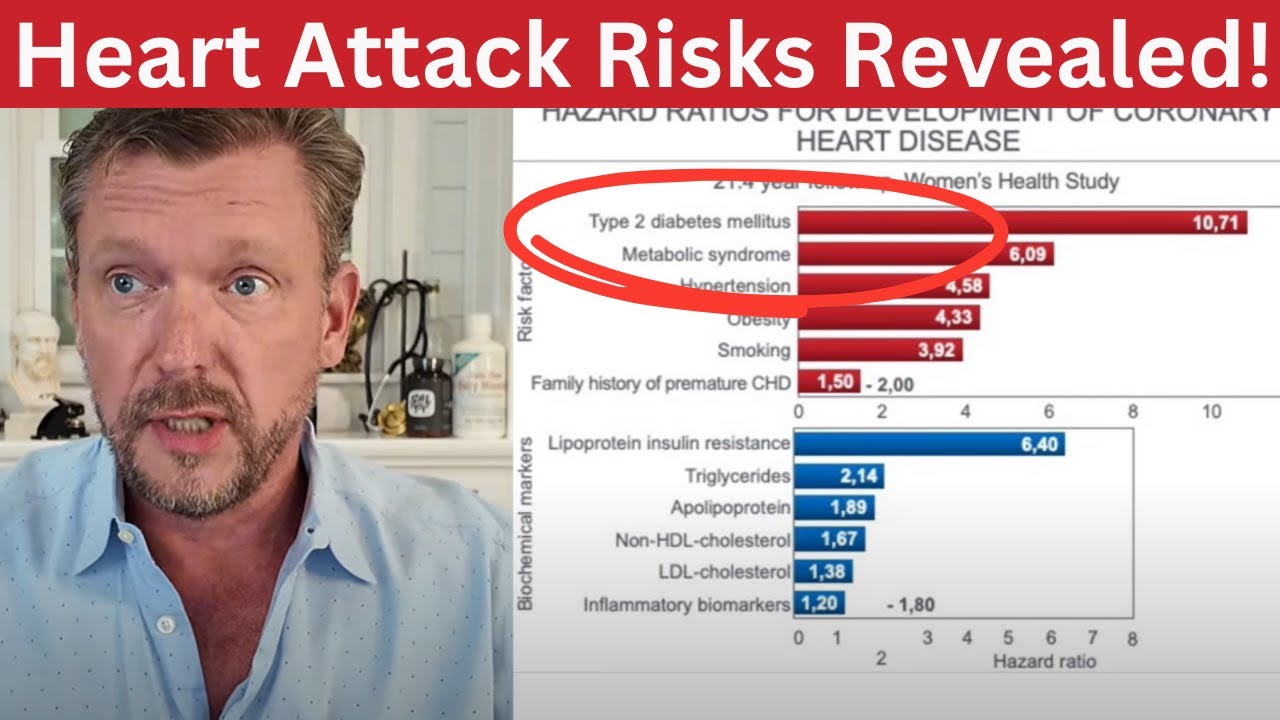In the “Real Heart Attack Causes Revealed! (And what you Can Do) – 2024” video by KenDBerryMD, you will uncover the true causes of heart attacks and learn about the risk factors that increase your chances of experiencing one. High levels of LDL-C are identified as a significant risk factor, along with type 2 diabetes, metabolic syndrome, hypertension, obesity, smoking, and genetic factors. Dr. Ken D. Berry, a seasoned Family Physician, emphasizes the importance of focusing on reversing these major risk factors to reduce the likelihood of a heart attack. By adopting a proper human diet, such as keto or carnivore, individuals can take steps towards reversing their risk factors and improving their overall heart health.
Dr. Ken D. Berry’s extensive clinical experience and informative video shed light on the critical factors contributing to heart attacks. With a focus on educating viewers about the most impactful risk factors, like type 2 diabetes and metabolic syndrome, this video arms you with the knowledge needed to prioritize your heart health. By understanding the significance of lifestyle factors in heart attack risk, you can make informed choices to mitigate these risks and potentially prevent a life-altering event. Subscribe and share the video to help spread awareness about reducing heart attack risks and taking proactive steps towards a healthier future.
Real Heart Attack Causes Revealed
When it comes to the causes of heart attacks, several risk factors play a significant role. High levels of LDL-C (Low-Density Lipoprotein Cholesterol) are considered a crucial risk factor for heart attacks. Type 2 diabetes is identified as the primary risk factor for heart attacks, with a hazard ratio of 10.71, making it a substantial contributor to cardiovascular issues. Metabolic syndrome, a cluster of conditions like high blood pressure and high triglycerides, also poses a significant risk for heart attacks. The impact of hypertension on heart attacks cannot be overlooked, as it is a known risk factor. Obesity, characterized by excessive body weight, is identified as a major risk factor for heart attacks. While smoking is harmful, it is considered less of a risk factor compared to diabetes and metabolic syndrome. Additionally, family history and genetic factors, though influential to some extent, are considered less significant compared to lifestyle factors when it comes to heart attack risks.
High LDL-C levels as a risk factor
Increased levels of LDL-C are associated with a higher risk of developing heart attacks. Monitoring and managing LDL-C levels through lifestyle modifications and medical interventions can help reduce the risk of cardiovascular events.
Type 2 diabetes as the main risk factor
Type 2 diabetes presents a substantial risk for heart attacks, with individuals having this condition being at a significantly higher risk. Controlling blood sugar levels and managing diabetes effectively are essential in lowering the risk of heart attacks.
Metabolic syndrome as a significant risk factor
Metabolic syndrome, characterized by a combination of conditions such as high blood pressure and elevated triglycerides, contributes to the risk of heart attacks. Addressing the components of metabolic syndrome through lifestyle changes can help mitigate this risk.
Impact of hypertension on heart attacks
Hypertension, or high blood pressure, is a known risk factor for heart attacks. Managing blood pressure levels through dietary modifications, exercise, and medications can help reduce the likelihood of cardiovascular events.
Obesity as a major risk factor
Obesity, defined by excessive body weight, is a significant risk factor for heart attacks. Adopting healthier eating habits, increasing physical activity, and losing weight can lower the risk associated with obesity.
Smoking compared to other risk factors
Smoking is detrimental to heart health but is considered less of a risk factor compared to conditions like diabetes and metabolic syndrome. Quitting smoking can significantly reduce the risk of heart attacks and improve overall cardiovascular health.
Role of family history and genetic factors
Although family history and genetic factors can influence the risk of heart attacks, lifestyle choices and managing modifiable risk factors such as diabetes, obesity, and hypertension play a more prominent role in preventing cardiovascular events.
Key Information from KenDBerryMD Video
In the informative video by KenDBerryMD, critical insights into the real causes of heart attacks are provided. Dr. Ken D. Berry, a seasoned Family Physician with over 20 years of clinical experience, shares valuable information on the major risk factors for heart attacks. It is essential to note that the information presented in the video is for general guidance and not a substitute for personalized medical advice. Dr. Ken D. Berry emphasizes the importance of seeking guidance from qualified healthcare professionals for individualized care. Updates and changes to the information on the channel may occur at Dr. Ken D. Berry’s discretion. Additionally, viewers are encouraged to subscribe and share the content to raise awareness about heart attack risks.
Dr. Ken D. Berry’s experience and qualifications
Dr. Ken D. Berry’s extensive experience as a Family Physician adds credibility to the information shared in the video. With over two decades of clinical practice, Dr. Berry brings a wealth of knowledge and expertise to discussions about heart health and risk factors.
Disclaimer on information provided
Viewers are reminded that the information presented in the video serves as general guidance and should not replace professional medical advice. Consulting with healthcare professionals is crucial for personalized care and management of individual health conditions.
Updates and changes to information on the channel
As new research and insights emerge, Dr. Ken D. Berry may update or modify the information presented on the channel. Staying informed and open to evolving recommendations is essential for viewers seeking to enhance their understanding of heart attack risks.
Liability disclaimer for content use
Dr. Ken D. Berry is not liable for any damages resulting from the access or use of the content on the channel. Viewers are encouraged to engage with the material responsibly and consult with healthcare professionals for personalized care and guidance.
Encouragement to subscribe and share for spreading awareness
To help disseminate valuable information on heart attack risks and prevention strategies, viewers are encouraged to subscribe to the channel and share the content with others. By raising awareness and promoting healthy lifestyle choices, individuals can take proactive steps towards reducing their risk of heart attacks.

Guidelines to Reduce Heart Attack Risk
Reducing the risk of heart attacks involves adopting a holistic approach that focuses on lifestyle modifications and proper dietary habits. A key component of heart attack prevention is following a human diet that supports cardiovascular health. The availability of the Human Diet Guidebook on drberry.com offers valuable insights into dietary choices that can help mitigate risk factors for heart attacks. Various types of diets, such as the keto or carnivore diet, are highlighted as effective in reversing risk factors associated with heart attacks. Regular consultation with healthcare professionals is crucial in developing a personalized plan to reduce the risk of cardiovascular events.
Focus on proper human diet for prevention
Adhering to a proper human diet that supports heart health is essential in reducing the risk of heart attacks. By making informed dietary choices and prioritizing nutrient-rich foods, individuals can enhance their cardiovascular well-being and lower their risk of heart-related complications.
Availability of Human Diet Guidebook
The Human Diet Guidebook available on drberry.com serves as a comprehensive resource for individuals seeking guidance on dietary patterns conducive to heart health. Accessing this guidebook can provide valuable information on meal planning, food choices, and lifestyle modifications aimed at reducing the risk of heart attacks.
Types of diets that can reverse risk factors
Diets such as the keto or carnivore diet are recognized for their potential in reversing risk factors associated with heart attacks. These dietary approaches emphasize whole foods, healthy fats, and minimal processed ingredients, offering a nutritionally dense way to support heart health and mitigate cardiovascular risks.
Importance of regular consultation with healthcare professionals
Consulting with healthcare professionals on a regular basis is crucial for individuals looking to reduce their risk of heart attacks. Healthcare providers can offer personalized recommendations, monitor health parameters, and collaborate on tailored strategies to improve cardiovascular wellness.
Leading Risk Factors for Heart Attacks
The video by KenDBerryMD sheds light on the most significant risk factors for heart attacks, emphasizing the importance of addressing these factors to reduce the risk of cardiovascular events. By understanding and effectively managing these risk factors, individuals can take proactive steps towards improving their heart health and overall well-being.
Discussion on biggest risk factors in the video
Dr. Ken D. Berry discusses the major risk factors for heart attacks, highlighting the critical role of conditions like type 2 diabetes, metabolic syndrome, hypertension, obesity, and smoking in increasing cardiovascular risk. By recognizing and addressing these risk factors, individuals can work towards lowering their chances of experiencing a heart attack.
Effectiveness of diet in reducing risk
Diet plays a pivotal role in reducing the risk of heart attacks, with specific dietary patterns like the keto or carnivore diet showing promise in reversing risk factors associated with cardiovascular issues. Adopting a nutrient-dense and heart-healthy diet can significantly impact overall cardiovascular well-being and reduce the likelihood of heart attacks.
Comparison of different lifestyle factors
Dr. Ken D. Berry compares various lifestyle factors, such as obesity, smoking, hypertension, and genetic predisposition, in relation to their impact on heart attack risk. By understanding the relative significance of these factors, individuals can prioritize lifestyle modifications that have the greatest potential for reducing their risk of cardiovascular events.
Dr. Ken D. Berry’s emphasis on risk factor reversal
Dr. Ken D. Berry emphasizes the importance of reversing key risk factors for heart attacks to reduce the overall risk of cardiovascular events. By focusing on lifestyle changes, dietary modifications, and proactive health management, individuals can address these risk factors effectively and enhance their heart health.
By incorporating the insights from KenDBerryMD’s video and the guidelines for reducing heart attack risk, individuals can empower themselves to make informed choices that promote cardiovascular wellness and reduce their susceptibility to heart attacks. Taking proactive steps towards heart health through lifestyle modifications and healthy habits is key to safeguarding against cardiovascular complications.
